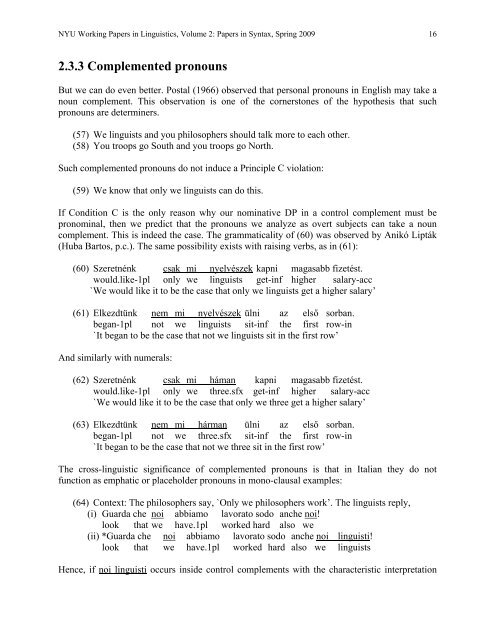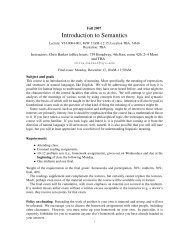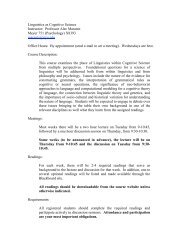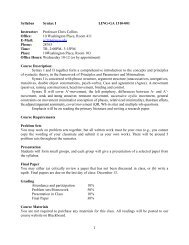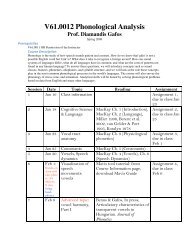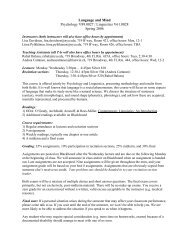Overt Nominative Subjects in Infinitival Complements Cross - NYU ...
Overt Nominative Subjects in Infinitival Complements Cross - NYU ...
Overt Nominative Subjects in Infinitival Complements Cross - NYU ...
Create successful ePaper yourself
Turn your PDF publications into a flip-book with our unique Google optimized e-Paper software.
<strong>NYU</strong> Work<strong>in</strong>g Papers <strong>in</strong> L<strong>in</strong>guistics, Volume 2: Papers <strong>in</strong> Syntax, Spr<strong>in</strong>g 2009 162.3.3 Complemented pronounsBut we can do even better. Postal (1966) observed that personal pronouns <strong>in</strong> English may take anoun complement. This observation is one of the cornerstones of the hypothesis that suchpronouns are determ<strong>in</strong>ers.(57) We l<strong>in</strong>guists and you philosophers should talk more to each other.(58) You troops go South and you troops go North.Such complemented pronouns do not <strong>in</strong>duce a Pr<strong>in</strong>ciple C violation:(59) We know that only we l<strong>in</strong>guists can do this.If Condition C is the only reason why our nom<strong>in</strong>ative DP <strong>in</strong> a control complement must bepronom<strong>in</strong>al, then we predict that the pronouns we analyze as overt subjects can take a nouncomplement. This is <strong>in</strong>deed the case. The grammaticality of (60) was observed by Anikó Lipták(Huba Bartos, p.c.). The same possibility exists with rais<strong>in</strong>g verbs, as <strong>in</strong> (61):(60) Szeretnénk csak mi nyelvészek kapni magasabb fizetést.would.like-1pl only we l<strong>in</strong>guists get-<strong>in</strong>f higher salary-acc`We would like it to be the case that only we l<strong>in</strong>guists get a higher salary’(61) Elkezdtünk nem mi nyelvészek ülni az első sorban.began-1pl not we l<strong>in</strong>guists sit-<strong>in</strong>f the first row-<strong>in</strong>`It began to be the case that not we l<strong>in</strong>guists sit <strong>in</strong> the first row’And similarly with numerals:(62) Szeretnénk csak mi háman kapni magasabb fizetést.would.like-1pl only we three.sfx get-<strong>in</strong>f higher salary-acc`We would like it to be the case that only we three get a higher salary’(63) Elkezdtünk nem mi hárman ülni az első sorban.began-1pl not we three.sfx sit-<strong>in</strong>f the first row-<strong>in</strong>`It began to be the case that not we three sit <strong>in</strong> the first row’The cross-l<strong>in</strong>guistic significance of complemented pronouns is that <strong>in</strong> Italian they do notfunction as emphatic or placeholder pronouns <strong>in</strong> mono-clausal examples:(64) Context: The philosophers say, `Only we philosophers work’. The l<strong>in</strong>guists reply,(i) Guarda che noi abbiamo lavorato sodo anche noi!look that we have.1pl worked hard also we(ii) *Guarda che noi abbiamo lavorato sodo anche noi l<strong>in</strong>guisti!look that we have.1pl worked hard also we l<strong>in</strong>guistsHence, if noi l<strong>in</strong>guisti occurs <strong>in</strong>side control complements with the characteristic <strong>in</strong>terpretation


